Deck 12: Static Equilibrium and Elasticity
Question
Question
Question
Question
Question
Question
Question
Question
Question
Question
Question
Question
Question
Question
Question
Question
Question
Question
Question
Question
Question
Question
Question
Question
Question
Question
Question
Question
Question
Question
Question
Question
Question
Question

Unlock Deck
Sign up to unlock the cards in this deck!
Unlock Deck
Unlock Deck
1/34
Play
Full screen (f)
Deck 12: Static Equilibrium and Elasticity
1
A uniform beam having a mass of 60 kg and a length of 2.8 m is held in place at its lower end by a pin.Its upper end leans against a vertical frictionless wall as shown in the figure.What is the magnitude of the force the pin exerts on the beam? 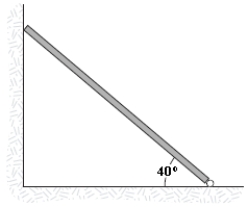
A)0.68 kN
B)0.57 kN
C)0.74 kN
D)0.63 kN
E)0.35 kN

A)0.68 kN
B)0.57 kN
C)0.74 kN
D)0.63 kN
E)0.35 kN
0.68 kN
2
A uniform 120-lb beam is supported in a horizontal position by a pin and cable as shown in the figure.What is the magnitude of the force by the pin on the beam? 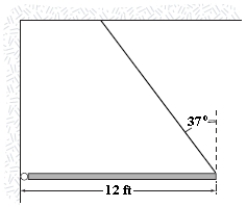
A)94 lb
B)88 lb
C)63 lb
D)75 lb
E)150 lb

A)94 lb
B)88 lb
C)63 lb
D)75 lb
E)150 lb
75 lb
3
A uniform 100-lb beam is held in a vertical position by a pin at its lower end and a cable at its upper end.A horizontal force (magnitude P)acts as shown in the figure.If P = 75 lb,what is the tension in the cable? 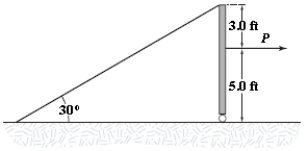
A)54 lb
B)69 lb
C)47 lb
D)61 lb
E)75 lb

A)54 lb
B)69 lb
C)47 lb
D)61 lb
E)75 lb
54 lb
4
Exhibit 12-1
A square of side is removed from one corner of a square sandwich that has sides of length L.The center of mass of the remainder of the sandwich moves from C to C'.
is removed from one corner of a square sandwich that has sides of length L.The center of mass of the remainder of the sandwich moves from C to C'. 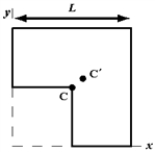 Use this exhibit to answer the following question(s).
Use this exhibit to answer the following question(s).
Refer to Exhibit 12-1.The distance from C to C' is
A) .
.
B) .
.
C) .
.
D) .
.
E) .
.
A square of side
 is removed from one corner of a square sandwich that has sides of length L.The center of mass of the remainder of the sandwich moves from C to C'.
is removed from one corner of a square sandwich that has sides of length L.The center of mass of the remainder of the sandwich moves from C to C'.  Use this exhibit to answer the following question(s).
Use this exhibit to answer the following question(s).Refer to Exhibit 12-1.The distance from C to C' is
A)
 .
.B)
 .
.C)
 .
.D)
 .
.E)
 .
.
Unlock Deck
Unlock for access to all 34 flashcards in this deck.
Unlock Deck
k this deck
5
The center of gravity of an object is at the same position as the center of mass when
A) is the same at both ends of the object.
is the same at both ends of the object.
B)the object is located in a region where is uniform over the entire object.
is uniform over the entire object.
C)the object is as large as the body that exerts the gravitational force on it.
D)any of the conditions above is satisfied.
E)either (a)or (b)above is satisfied.
A)
 is the same at both ends of the object.
is the same at both ends of the object.B)the object is located in a region where
 is uniform over the entire object.
is uniform over the entire object.C)the object is as large as the body that exerts the gravitational force on it.
D)any of the conditions above is satisfied.
E)either (a)or (b)above is satisfied.

Unlock Deck
Unlock for access to all 34 flashcards in this deck.
Unlock Deck
k this deck
6
The figure shows a uniform,horizontal beam (length = 10 m,mass = 25 kg)that is pivoted at the wall,with its far end supported by a cable that makes an angle of 51° with the horizontal.If a person (mass = 60 kg)stands 3.0 m from the pivot,what is the tension in the cable? 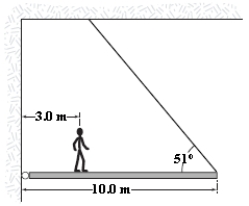
A)0.83 kN
B)0.30 kN
C)0.38 kN
D)0.42 kN
E)3.0 kN

A)0.83 kN
B)0.30 kN
C)0.38 kN
D)0.42 kN
E)3.0 kN

Unlock Deck
Unlock for access to all 34 flashcards in this deck.
Unlock Deck
k this deck
7
Angie says that an object is in equilibrium if the net torques about the center of mass is zero.Robbie says that an object is in equilibrium if the sum of external forces is zero.Which one,if either,is correct?
A)Both are correct: an object is in equilibrium if either condition holds.
B)Neither is correct: both conditions must hold simultaneously.
C)Neither is correct: the net external force and the net external torque about any axis must be zero.
D)Neither is correct: an object is in equilibrium only if its velocity is zero in all coordinate systems.
E)Both are correct: if the sum of the external forces is zero,the net torque about any axis is automatically zero,and vice versa.
A)Both are correct: an object is in equilibrium if either condition holds.
B)Neither is correct: both conditions must hold simultaneously.
C)Neither is correct: the net external force and the net external torque about any axis must be zero.
D)Neither is correct: an object is in equilibrium only if its velocity is zero in all coordinate systems.
E)Both are correct: if the sum of the external forces is zero,the net torque about any axis is automatically zero,and vice versa.

Unlock Deck
Unlock for access to all 34 flashcards in this deck.
Unlock Deck
k this deck
8
Exhibit 12-1
A square of side is removed from one corner of a square sandwich that has sides of length L.The center of mass of the remainder of the sandwich moves from C to C'.
is removed from one corner of a square sandwich that has sides of length L.The center of mass of the remainder of the sandwich moves from C to C'.  Use this exhibit to answer the following question(s).
Use this exhibit to answer the following question(s).
Refer to Exhibit 12-1.The displacement of the y coordinate of the center of mass (from C to C')is
A) .
.
B) .
.
C) .
.
D) .
.
E) .
.
A square of side
 is removed from one corner of a square sandwich that has sides of length L.The center of mass of the remainder of the sandwich moves from C to C'.
is removed from one corner of a square sandwich that has sides of length L.The center of mass of the remainder of the sandwich moves from C to C'.  Use this exhibit to answer the following question(s).
Use this exhibit to answer the following question(s).Refer to Exhibit 12-1.The displacement of the y coordinate of the center of mass (from C to C')is
A)
 .
.B)
 .
.C)
 .
.D)
 .
.E)
 .
.
Unlock Deck
Unlock for access to all 34 flashcards in this deck.
Unlock Deck
k this deck
9
How large a force is necessary to stretch a 2.0-mm diameter copper wire (Y = 11 × 1010 N/m2)by 1.0%?
A)2.1 kN
B)3.5 kN
C)6.9 kN
D)11 kN
E)5.4 kN
A)2.1 kN
B)3.5 kN
C)6.9 kN
D)11 kN
E)5.4 kN

Unlock Deck
Unlock for access to all 34 flashcards in this deck.
Unlock Deck
k this deck
10
Pairs of forces of equal magnitude act on identical cylinders as shown in the figures.In which example is the cylinder in translational and rotational equilibrium?
A)
B)
C)
D)
E)
A)

B)

C)

D)

E)


Unlock Deck
Unlock for access to all 34 flashcards in this deck.
Unlock Deck
k this deck
11
How large a pressure increase (in ATM)must be applied to water if it is to be compressed in volume by 1.0%? The bulk modulus of water is 2.0 × 109 N/m2 and 1 ATM = 1.0 × 105 N/m2.
A)50 ATM
B)100 ATM
C)1 100 ATM
D)400 ATM
E)200 ATM
A)50 ATM
B)100 ATM
C)1 100 ATM
D)400 ATM
E)200 ATM

Unlock Deck
Unlock for access to all 34 flashcards in this deck.
Unlock Deck
k this deck
12
The diagrams below show forces of magnitude F applied to an equilateral triangular block of uniform thickness.In which diagram(s)is(are)the block in equilibrium? 
A)A
B)B
C)C
D)D
E)A and B

A)A
B)B
C)C
D)D
E)A and B

Unlock Deck
Unlock for access to all 34 flashcards in this deck.
Unlock Deck
k this deck
13
Which one of the following cannot be a definition of an elastic modulus?
A)
B)
C)
D)
E)
A)

B)

C)

D)

E)


Unlock Deck
Unlock for access to all 34 flashcards in this deck.
Unlock Deck
k this deck
14
A horizontal uniform meter stick supported at the 50-cm mark has a mass of 0.50 kg hanging from it at the 20-cm mark and a 0.30 kg mass hanging from it at the 60-cm mark.Determine the position on the meter stick at which one would hang a third mass of 0.60 kg to keep the meter stick balanced.
A)74 cm
B)70 cm
C)65 cm
D)86 cm
E)62 cm
A)74 cm
B)70 cm
C)65 cm
D)86 cm
E)62 cm

Unlock Deck
Unlock for access to all 34 flashcards in this deck.
Unlock Deck
k this deck
15
A uniform ladder 15 ft long is leaning against a frictionless wall at an angle of 53° above the horizontal.The weight of the ladder is 30 pounds.A 75-lb boy climbs 6.0-ft up the ladder.What is the magnitude of the friction force exerted on the ladder by the floor?
A)43 lb
B)34 lb
C)38 lb
D)47 lb
E)24 lb
A)43 lb
B)34 lb
C)38 lb
D)47 lb
E)24 lb

Unlock Deck
Unlock for access to all 34 flashcards in this deck.
Unlock Deck
k this deck
16
The diagrams below show forces applied to a wheel that weighs 20 N.The symbol W stands for the weight.In which diagram(s)is(are)the wheel in equilibrium? 
A)A
B)B
C)C
D)D
E)A and C

A)A
B)B
C)C
D)D
E)A and C

Unlock Deck
Unlock for access to all 34 flashcards in this deck.
Unlock Deck
k this deck
17
Exhibit 12-1
A square of side is removed from one corner of a square sandwich that has sides of length L.The center of mass of the remainder of the sandwich moves from C to C'.
is removed from one corner of a square sandwich that has sides of length L.The center of mass of the remainder of the sandwich moves from C to C'.  Use this exhibit to answer the following question(s).
Use this exhibit to answer the following question(s).
Refer to Exhibit 12-1.The displacement of the x coordinate of the center of mass (from C to C')is
A) .
.
B) .
.
C) .
.
D) .
.
E) .
.
A square of side
 is removed from one corner of a square sandwich that has sides of length L.The center of mass of the remainder of the sandwich moves from C to C'.
is removed from one corner of a square sandwich that has sides of length L.The center of mass of the remainder of the sandwich moves from C to C'.  Use this exhibit to answer the following question(s).
Use this exhibit to answer the following question(s).Refer to Exhibit 12-1.The displacement of the x coordinate of the center of mass (from C to C')is
A)
 .
.B)
 .
.C)
 .
.D)
 .
.E)
 .
.
Unlock Deck
Unlock for access to all 34 flashcards in this deck.
Unlock Deck
k this deck
18
A 20-m long steel wire (cross-section 1.0 cm2,Young's modulus 2.0 × 1011 N/m2),is subjected to a load of 25 000 N.How much will the wire stretch under the load?
A)0.25 cm
B)2.5 cm
C)12.5 cm
D)25 cm
E)1.25 cm
A)0.25 cm
B)2.5 cm
C)12.5 cm
D)25 cm
E)1.25 cm

Unlock Deck
Unlock for access to all 34 flashcards in this deck.
Unlock Deck
k this deck
19
One of the curators at the art museum is tilting a large cylinder backward.At what angle θ will the cylinder of height h and radius r be in unstable equilibrium? 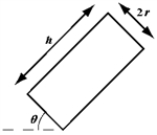
A) .
.
B) .
.
C) .
.
D) .
.
E) .
.

A)
 .
.B)
 .
.C)
 .
.D)
 .
.E)
 .
.
Unlock Deck
Unlock for access to all 34 flashcards in this deck.
Unlock Deck
k this deck
20
A 25-ft long crane supported at its lower end by a pin is elevated by a horizontal cable as shown in the figure.A 250-lb load is suspended from the outer end of the crane.The center of gravity of the crane is 10 ft from the pin,and the crane weighs 200 lb.What is the tension in the horizontal cable? 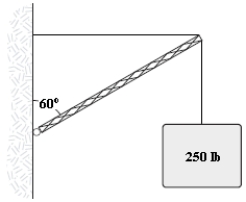
A)610 lb
B)540 lb
C)640 lb
D)570 lb
E)2 000 lb

A)610 lb
B)540 lb
C)640 lb
D)570 lb
E)2 000 lb

Unlock Deck
Unlock for access to all 34 flashcards in this deck.
Unlock Deck
k this deck
21
If 1.0 m3 of concrete weighs 5 × 104 N,what is the height of the tallest cylindrical concrete pillar that will not collapse under its own weight? (The compression strength of concrete is 1.7 × 107 N/m2)

Unlock Deck
Unlock for access to all 34 flashcards in this deck.
Unlock Deck
k this deck
22
The 1 560 kg solid steel door to a bank vault is 2.00 m high,1.00 m wide and 10 cm thick.One hinge is 60.0 cm down from the top on the left hand side of the door.The other hinge is 30.0 cm up from the bottom.What horizontal force,in what direction,does the door exert on the lower hinge?
A)6 950 N,left
B)6 950 N,right
C)7 640 N,left
D)7 640 N,right
E)15 300 N,left
A)6 950 N,left
B)6 950 N,right
C)7 640 N,left
D)7 640 N,right
E)15 300 N,left

Unlock Deck
Unlock for access to all 34 flashcards in this deck.
Unlock Deck
k this deck
23
Sebastian has drawn a free-body diagram for a ladder of mass m leaning against a frictionless wall.His diagram is shown below.What is his error? 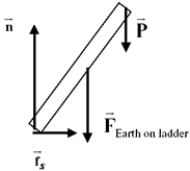
A) is in the wrong direction.
is in the wrong direction.
B) should be directed upwards,not down.
should be directed upwards,not down.
C) should be perpendicular to the wall,not parallel to it.
should be perpendicular to the wall,not parallel to it.
D) should be down into the floor for
should be down into the floor for  to have the given direction.
to have the given direction.
E) is correct,but there should also be a force perpendicular to the wall.
is correct,but there should also be a force perpendicular to the wall.

A)
 is in the wrong direction.
is in the wrong direction.B)
 should be directed upwards,not down.
should be directed upwards,not down.C)
 should be perpendicular to the wall,not parallel to it.
should be perpendicular to the wall,not parallel to it.D)
 should be down into the floor for
should be down into the floor for  to have the given direction.
to have the given direction.E)
 is correct,but there should also be a force perpendicular to the wall.
is correct,but there should also be a force perpendicular to the wall.
Unlock Deck
Unlock for access to all 34 flashcards in this deck.
Unlock Deck
k this deck
24
John is carrying a shovelful of snow.The center of mass of the 3.00 kg of snow he is holding is 15.0 cm from the end of the shovel.He is pushing down on the opposite end of the shovel with one hand and holding it up 30.0 cm from that end with his other hand.Ignore the mass of the shovel.Sarah says that his hand pushing down on the shovel must be exerting a greater force than the hand pushing up.James says it is just the reverse.Which one,if either,is correct?
A)Sarah,because the hand pushing down must exert a greater force to match the torque exerted by the snow.
B)James,because,depending on the location of the axis of rotation,the hand pushing down can counteract the torque exerted by the snow.
C)James,because the hand pushing up must exert a force that equals the sum of the force of the hand pushing down and the weight of the snow.
D)James,because both (b)and (c)above are correct.
E)Neither,because the hands exert forces of equal magnitudes.
A)Sarah,because the hand pushing down must exert a greater force to match the torque exerted by the snow.
B)James,because,depending on the location of the axis of rotation,the hand pushing down can counteract the torque exerted by the snow.
C)James,because the hand pushing up must exert a force that equals the sum of the force of the hand pushing down and the weight of the snow.
D)James,because both (b)and (c)above are correct.
E)Neither,because the hands exert forces of equal magnitudes.

Unlock Deck
Unlock for access to all 34 flashcards in this deck.
Unlock Deck
k this deck
25
The 1 560 kg solid steel door to a bank vault is 2.00 m high,1.00 m wide and 10 cm thick.One hinge is 60.0 cm down from the top on the left hand side of the door.The other hinge is 30.0 cm up from the bottom.What horizontal force,in what direction,does the door exert on the upper hinge?
A)6 950 N,left
B)6 950 N,right
C)7 640 N,left
D)7 640 N,right
E)15 300 N,left
A)6 950 N,left
B)6 950 N,right
C)7 640 N,left
D)7 640 N,right
E)15 300 N,left

Unlock Deck
Unlock for access to all 34 flashcards in this deck.
Unlock Deck
k this deck
26
The free body diagram below represents a 1 500 kg car sitting on a 3 000 kg bridge supported at its far ends.The car's position is three quarters of the length L from the left end of the bridge.Identify the one error in the torque equation below: 
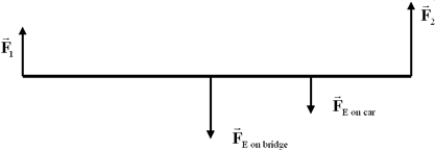
A) never produces a torque on the bridge no matter where the axis of rotation is placed.
never produces a torque on the bridge no matter where the axis of rotation is placed.
B) never produces a torque on the bridge no matter where the axis of rotation is placed.
never produces a torque on the bridge no matter where the axis of rotation is placed.
C) cannot produce a torque on the bridge no matter where the axis of rotation is taken since it is at the center of the bridge.
cannot produce a torque on the bridge no matter where the axis of rotation is taken since it is at the center of the bridge.
D)Because the perpendicular distance to from the left end of the bridge is 0,F1L should be 0.
from the left end of the bridge is 0,F1L should be 0.
E)Because the perpendicular distance to from the right end of the bridge is 0,F2L should be 0.
from the right end of the bridge is 0,F2L should be 0.


A)
 never produces a torque on the bridge no matter where the axis of rotation is placed.
never produces a torque on the bridge no matter where the axis of rotation is placed.B)
 never produces a torque on the bridge no matter where the axis of rotation is placed.
never produces a torque on the bridge no matter where the axis of rotation is placed.C)
 cannot produce a torque on the bridge no matter where the axis of rotation is taken since it is at the center of the bridge.
cannot produce a torque on the bridge no matter where the axis of rotation is taken since it is at the center of the bridge.D)Because the perpendicular distance to
 from the left end of the bridge is 0,F1L should be 0.
from the left end of the bridge is 0,F1L should be 0.E)Because the perpendicular distance to
 from the right end of the bridge is 0,F2L should be 0.
from the right end of the bridge is 0,F2L should be 0.
Unlock Deck
Unlock for access to all 34 flashcards in this deck.
Unlock Deck
k this deck
27
The four tires of an automobile are inflated to a gauge pressure of 2.0 × 105 N/m2 (29 PSI).Each of the four tires has an area of 0.024 m2 that is in contact with the ground.Determine the weight of the auto.

Unlock Deck
Unlock for access to all 34 flashcards in this deck.
Unlock Deck
k this deck
28
Stress is proportional to strain means that
A)stress = constant × strain.
B)stress = (constant 1)× strain + constant 2.
C)stress = .
.
D)stress = .
.
E)stress × strain = constant.
A)stress = constant × strain.
B)stress = (constant 1)× strain + constant 2.
C)stress =
 .
.D)stress =
 .
.E)stress × strain = constant.

Unlock Deck
Unlock for access to all 34 flashcards in this deck.
Unlock Deck
k this deck
29
A horizontal uniform 1.20-N meter stick is held up by two vertical strings,one at the 20-cm mark and the other at the 60-cm mark.What is the tension in the string at the 60-cm mark?
A)0.30 N
B)0.45 N
C)0.60 N
D)0.90 N
E)1.0 N
A)0.30 N
B)0.45 N
C)0.60 N
D)0.90 N
E)1.0 N

Unlock Deck
Unlock for access to all 34 flashcards in this deck.
Unlock Deck
k this deck
30
A non-uniform meter stick is found to balance on a knife edge at the 60-cm mark.Where is the center of gravity of the meter stick?
A)at the 40-cm mark
B)at the 45-cm mark
C)at the 50-cm mark
D)at the 55-cm mark
E)at a position not given
A)at the 40-cm mark
B)at the 45-cm mark
C)at the 50-cm mark
D)at the 55-cm mark
E)at a position not given

Unlock Deck
Unlock for access to all 34 flashcards in this deck.
Unlock Deck
k this deck
31
Find the minimum diameter of a steel wire 18 m long that will stretch no more than 9 mm when a load of 380 kg is hung on the lower end.(Y steel = 2.0 × 1011 N/m2).

Unlock Deck
Unlock for access to all 34 flashcards in this deck.
Unlock Deck
k this deck
32
An object of mass m is suspended by two coplanar wires,as shown below.The tension in each wire has a magnitude given by 
A) .
.
B) .
.
C) .
.
D)mg.
E) .
.

A)
 .
.B)
 .
.C)
 .
.D)mg.
E)
 .
.
Unlock Deck
Unlock for access to all 34 flashcards in this deck.
Unlock Deck
k this deck
33
A mobile is made of identical objects of mass m suspended so that the lowest row has one object,the row above two objects,and the row above three objects.All the strings are at 45° angles.What is the average tension in the strings connecting the highest row to the ceiling? 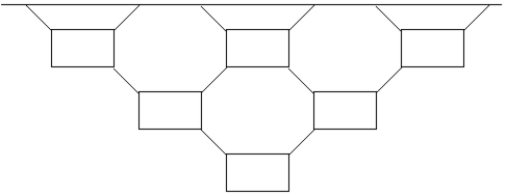
A)
B)
C)mg
D)
E)

A)

B)

C)mg
D)

E)


Unlock Deck
Unlock for access to all 34 flashcards in this deck.
Unlock Deck
k this deck
34
For safety in climbing,a mountaineer uses a 50-m long nylon rope that is 1.0 cm in diameter.When supporting a 90-kg climber,the rope elongates 1.6 m.Find the Young's modulus for the rope material.

Unlock Deck
Unlock for access to all 34 flashcards in this deck.
Unlock Deck
k this deck


